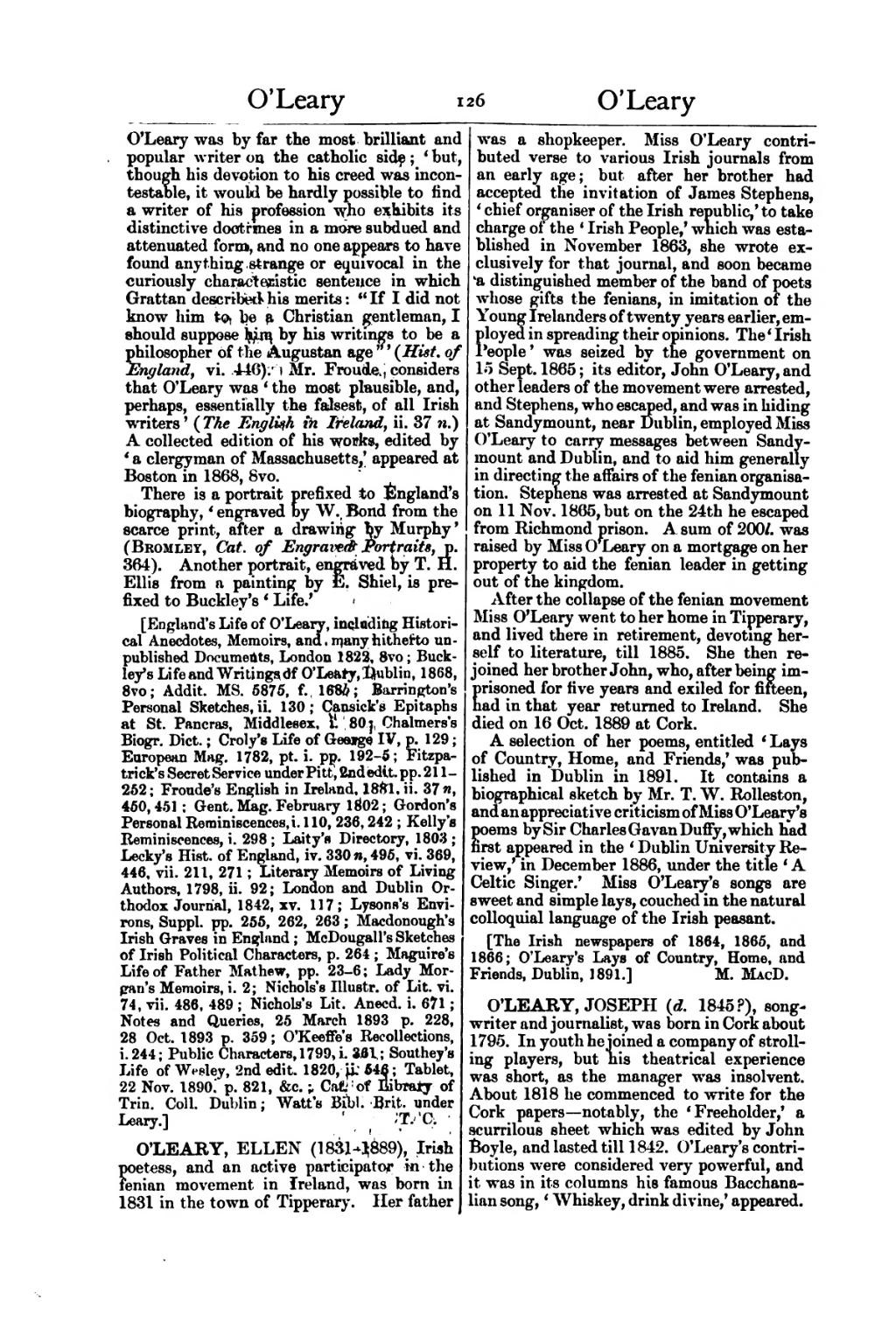O'Leary was by far the most brilliant and popular writer on the catholic side; 'but, though his devotion to his creed was incontestable, it would be hardly possible to find a writer of his profession who exhibits its distinctive doctrines in a more subdued and attenuated form, and no one appears to have found anything strange or equivocal in the curiously characteristic sentence in which Grattan described his merits: "If I did not know him to be a Christian gentleman, I should suppose him by his writings to be a philosopher of the Augustan age' (Hist. of England, vi. 440). Mr. Froude considers that O'Leary was 'the most plausible, and, perhaps, essentially the falsest, of all Irish writers' (The English in Ireland, ii. 37 n.) A collected edition of his works, edited by 'a clergyman of Massachusetts,' appeared at Boston in 1868, 8vo.
There is a portrait prefixed to England's biography, 'engraved by W. Bond from the scarce print, after a drawing by Murphy' (Bromley, Cat. of Engraved Portraits, p. 364). Another portrait, engraved by T. H. Ellis from a painting by E. Shiel, is prefixed to Buckley's 'Life.'
[England's Life of O'Leary, including Historical Anecdotes, Memoirs, and many hitherto unpublished Documents, London 1822, 8vo; Buckley's Life and Writings of O'Leary, Dublin, 1868, 8vo; Addit. MS. 5876, f. 1686; Barrington's Personal Sketches, ii. 130; Cansick's Epitaphs at St. Pancras, Middlesex, i. 80; Chalmers's Biogr. Dict.; Croly's Life of George IV, p. 129; European Mag. 1782, pt. i. pp. 192-5; Fitzpatrick's Secret Service under Pitt, 2nd edit. pp. 211-252; Froude's English in Ireland, 1881,ii. 37 n, 450, 451; Gent. Mag. February 1802; Gordon's Personal Reminiscences, i. 110, 236, 242; Kelly's Reminiscences, i. 298; Laity's Directory, 1803; Lecky's Hist. of England, iv. 330 n, 495, vi. 369, 446, vii. 211, 271; Literary Memoirs of Living Authors, 1798, ii. 92; London and Dublin Orthodox Journal, 1842, xv. 117; Lysons's Environs, Suppl. pp. 255, 262, 263; Macdonough's Irish Graves in England; McDougall's Sketches of Irish Political Characters, p. 264; Maguire's Life of Father Mathew, pp. 23-6; Lady Morgan's Memoirs, i. 2; Nichols's Illustr. of Lit. vi. 74, vii. 486, 489 ; Nichols's Lit. Anecd. i. 671 ; Notes and Queries, 25 March 1893 p. 228, 28 Oct. 1893 p. 359; O'Keeffe's Recollections, i.244; Public Characters, 1799, i. 361; Southey's Life of Wesley, 2nd edit. 1820, ii. 546; Tablet, 22 Nov. 1890, p. 821, &c.; Cat. of Library of Trin. Coll. Dublin; Watt's Bibl. Brit, under Leary.]
O'LEARY, ELLEN (1831–1889), Irish poetess, and an active participator in the fenian movement in Ireland, was born in 1831 in the town of Tipperary. Her father was a shopkeeper. Miss O'Leary contributed verse to various Irish journals from an early age; but after her brother had accepted the invitation of James Stephens, 'chief organiser of the Irish republic,' to take charge of the 'Irish People,' which was established in November 1863, she wrote exclusively for that journal, and soon became a distinguished member of the band of poets whose gifts the fenians, in imitation of the Young Irelanders of twenty years earlier, employed in spreading their opinions. The 'Irish People' was seized by the government on 15 Sept. 1865; its editor, John O'Leary, and other leaders of the movement were arrested, and Stephens, who escaped, and was in hiding at Sandymount, near Dublin, employed Miss O'Leary to carry messages between Sandymount and Dublin, and to aid him generally in directing the affairs of the fenian organisation. Stephens was arrested at Sandymount on 11 Nov. 1805, but on the 24th he escaped from Richmond prison. A sum of 200l. was raised by Miss O Leary on a mortgage on her property to aid the fenian leader in getting out of the kingdom.
After the collapse of the fenian movement Miss O'Leary went to her home in Tipperary, and lived there in retirement, devoting herself to literature, till 1885. She then rejoined her brother John, who, after being imprisoned for five years and exiled for fifteen, had in that year returned to Ireland. She died on 16 Oct. 1889 at Cork.
A selection of her poems, entitled 'Lays of Country, Home, and Friends,' was published in Dublin in 1891. It contains a biographical sketch by Mr. T. W. Rolleston, and an appreciative criticism of Miss O'Leary's poems by Sir Charles Gavan Duffy, which had first appeared in the 'Dublin University Review,' in December 1886, under the title 'A Celtic Singer.' Miss O'Leary's songs are sweet and simple lays, couched in the natural colloquial language of the Irish peasant.
[The Irish newspapers of 1864, I860, and 1866; O'Leary's Lays of Country, Home, and Friends, Dublin, 1891.]
O'LEARY, JOSEPH (d. 1845?), songwriter and journalist, was born in Cork about 1795. In youth he joined a company of strolling players, but his theatrical experience was short, as the manager wras insolvent. About 1818 he commenced to write for the Cork papers — notably, the 'Freeholder,' a scurrilous sheet which was edited by John Boyle, and lasted till 1842. O'Leary's contributions were considered very powerful, and it was in its columns his famous Bacchanalian song, 'Whiskey, drink divine,' appeared.
